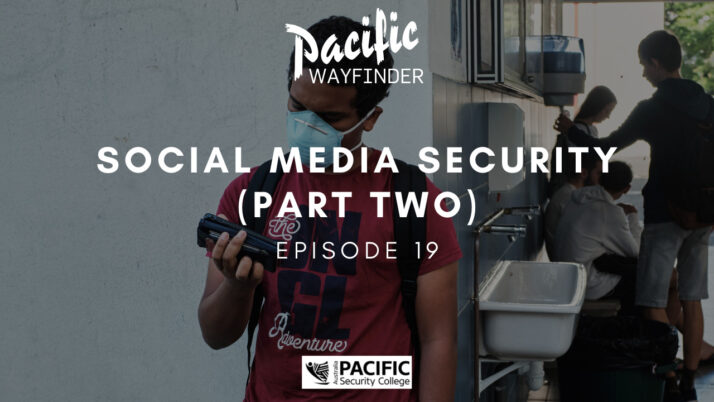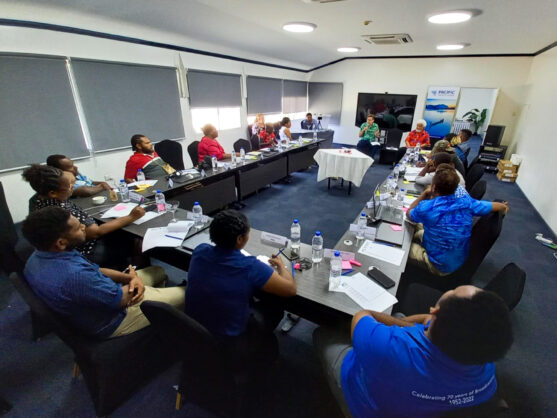Pacific Wayfinder: The Development and Dangers of Social Media

Voices from the Pacific Island region
The development and dangers of social media. The growing ubiquity of social media in Pacific Island states has created opportunities and risks, Eliorah Malifa writes for the Pacific Wayfinder series.
Social media and mobile phone usage in the Pacific is expanding rapidly, prompting discussion about the influence of social media on elections this year in Fiji and Papua New Guinea.
Nick McDonnell, Head of Public Policy for New Zealand/Pacific at Meta, along with Dr Amanda H A Watson and Jope Tarai from The Australian National University, sat down on the Pacific Wayfinder podcast to discuss the implications of this shift for Pacific communities.
All three agreed that social media has had a significant effect on most aspects of urban Pacific life, extending beyond personal social connections to being increasingly important tools for Pacific businesses.
This proliferation has provoked a strong response from government, according to Tarai.
“Well initially their reaction was an overreaction,” he said.
“Samoa had threats about banning Facebook. I think Nauru and the Marshall Islands had similar instances; PNG talked about legislation around that. Fiji, of course…they didn’t see online discussions as a potential for civic engagement.”
The public backlash to these proposed bans however, resulted in Pacific governments rolling back much of this legislation and deciding instead to work with rather than against social media platforms.
Many governments now utilise social media platforms, with some beginning to embrace the concept of ‘e-government’ to disseminate important information about health, elections, or other public services.
“So for instance you could have telephone hotlines so people could ring up and get accurate, reliable information about COVID-19, the measles or other health issues, or they could be text message based services or indeed they could be internet-based services including possibly things through social media,” Dr Watson said.
Despite their increasing centrality to much of Pacific public life, there has been little research on how social platforms are or could be utilised better in the region. Listening to these communities could reveal avenues to strengthen technology, how it is used, and demonstrate the areas that require a targeted policy approach.
Cyber-safety is one major area of concern. According to Nick McDonnell, Meta – which owns Facebook, by far the most-used social media platform in the Pacific – is taking steps to implement programs and policies that bolster cyber safety awareness in Pacific communities.
McDonnell outlined policies and programs developed by Meta to combat disinformation on social media in the Pacific. Specifically, he touched on Meta’s policy against creating fake accounts, monthly reports published on coordinated and authentic behaviour, and monitoring of election integrity and political advertising.
To this end, social media networks are also creating partnerships with international publishers and media outlets to ensure the safety of journalists reporting on their platforms. Dr Watson argued that a thriving and diverse traditional media environment is crucial.
Another key role social media platforms play in the region is connecting transnational communities back to the region, especially in places like Australia and New Zealand where large Pacific communities are based.
“I think it’s an untapped potential in terms of Australia’s own strategic interests in the region, especially in terms of values, democratic values,” Tarai said.
These communities have the potential to make a significant contribution Australia’s soft power capabilities and are able to communicate Australian values to their families in the region, he said, pointing to the influence of Samoan expatriate communities on their families back home during the country’s 2021 election and transnational campaign fundraising efforts serve as examples.
Dr Watson, however, cautioned that these connections are only possible via a few – often vulnerable – pieces of infrastructure. The volcanic eruption in Tonga earlier this year highlighted this vulnerability, rupturing the country’s lone undersea cable, severing its connection to both local emergency information and to the outside world.
Given the challenges the region faces, it’s clear that Pacific policymakers need to devote significant attention to social media policy. At a time of great uncertainty, it’s critical that the region remains connected.
This article is from our Pacific Wayfinder series, bringing you voices from the Pacific Island region. It is produced in conjunction with the Pacific Wayfinder podcast, produced by the Pacific Security College.
More Stories

Security Snapshot - 28 Mar 2024
Pacific Security Snapshot | 28 March 2024
Summary ➣ Heavy rains, floods, landslides and earthquakes batter the region ➣ Pacific submissions to the International Court of Justice (ICJ) on climate change responsibility ➣ Elections across the Pacific prompting changes to diplomatic relations and security arrangements ➣ Challenges for women in politics Climate Security Lives have been lost in PNG after a series…

Media Releases - 18 Sep 2023
National Security Reporting Course, Solomon Islands
PSC is pleased to have supported the Media Association of Solomon Islands (MASI) for the delivery of their National Security Reporting Course 2023. Journalists play an important role in updating and educating communities about security issues that affect them. Through effective sourcing and sharing of accurate and reliable information, robust local journalism can help foster…






